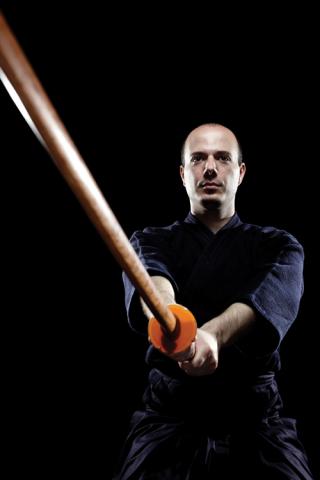Central Coast Active
Central Coast Active Flip-Book
Access Publishing
You are here
Home › Kendo anyone?Kendo anyone?

The sport is alive and well on the Central Coast
Want to try out a sport that’s being re-established on the Central Coast that offers participants an opportunity to gain valuable traits such as discipline, respect and good sportsmanship through a strict physical training regime?
Maybe it’s time to check out the martial art of Kendo.
Kendo is based on a collection of ancient Japanese sword fighting techniques which, grouped together, are known as Kenjutsu. Although the oldest written records of Kenjutsu date from the seventh and eighth centuries, the modern sport of Kendo has its roots in the early-to-mid 19th century and, after two decades of inactivity, is now alive and well on the Central Coast.
Kendo first came to the United States with Japanese immigrants in the early 1900s – first to Hawaii, and then shortly after, to the West Coast. The Central Coast first saw Kendo in San Luis Obispo with the establishment of the Japanese farming community in the 1930s.
Kendo was practiced in SLO until the outbreak of World War II and the Japanese Internment, and was then re-established after the war, continuing on until the early 1990s. At that point, the population of Kendoists had dwindled to less than 10. The group was driving to Santa Barbara and Lompoc to practice and, with the passing of the instructor in Lompoc, the group disbanded.
When I relocated to Paso Robles from Orange County in 2009 to take on the role of general manager at Barrel 27 Wine Company, I brought along 14 years of Kendo and Aikido practice, the first five of which were spent in Eastern Japan. With the generous support of Grand Master Glen Boyer, I start teaching Kendo in Paso Robles at the Central Coast Academy of Tae Kwon Do.
Shortly after, the San Luis Obispo Buddhist Temple generously offered the use of their facilities to once again offer Kendo at the temple. Buddhist temples in Japan and the U.S. have long served as cultural and community centers, many of which having a strong affiliation with the martial arts. Kendo, in particular, is very popular, with its emphasis on character development, respect, tradition, good sportsmanship and physical training.
In Kendo, one of the few Japanese martial arts that is widely-practiced by women, participants wear a jacket (uwagi), long divided skirt (hakama), chest protector (do), waist protector (tare), mask (men) and padded gloves (kote). To fence without risk of injury, a sword with a flat tip made of bamboo wrapped in waxed cord is used.
There are more that 2 million Kendo practitioners in Japan, with the world population of participants somewhere around 6 million. The Kendo World Championships are held every three years, with the event taking place in a different country each time, similar to the Olympics.
Traditionally, the three top-ranked Kendoists come from Japan, Korea and the U.S. I have been fortunate to have been instructed in the U.S. by Sandy Maruyama sensei, who has been a member of Team USA in several World Championships, and to have my current instructor as Taro Ariga sensei. Ariga sensei has also participated in multiple World Championships, captaining Canada’s team to an upset second place when he was in college. Currently he is the Portuguese National Team’s coach, and an advisory coach to Team USA, while teaching seminars in the U.S., Mexico, Portugal and actively competing in the Senior divisions.
Our Central Coast Kendo Dojo, through Ariga sensei’s Butokuden Dojo in Irvine, is part of the Southern California Kendo Organization and the All-U.S. Kendo Federation, which allows us to participate in tournaments and testings for rank.
Earlier this year we felt fortunate to host the first Annual Central Coast Kendo Gasshuku, a two-day seminar that saw more than 40 Kendoists from eight Southern California Dojos visiting Paso Robles to learn from a number of high-ranking sensei.
Jason Carter - is a partner and the general manager at Barrel 27 Wine Company in Paso Robles. In his spare time, he teaches Kendo in Paso Robles at Centennial Park and in San Luis Obispo at the SLO Buddhist Temple. For more information, contact him at 458-7800 or jason@barrel27.com.
